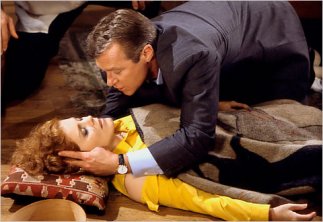We’ve been having a ridiculously extended discussion about soap operas, Quentin Tarantino, violence and other subjects at this thread. I really enjoyed this comment by Katherine Wirick, so thought I would give it it’s own post.
I grew up watching ALL MY CHILDREN, ONE LIFE TO LIVE and GENERAL HOSPITAL with my mother. Three hours a day, five days a week, every week.
So I speak from experience when I say that TV soap operas are violent. Spousal abuse, child abuse, murder, rape… I’m pretty sure I learned what rape *was* from a soap opera. They depict those acts of violence less graphically than Tarantino does, but they’re limited by network content restrictions. The part violence plays in soap opera narratives, however, is just as base and exploitative as any Tarantino film could be argued to be: it’s there to titillate you. It’s there to sell ad time. It’s there to make you tune in tomorrow.
In RESERVOIR DOGS, a man is shot in the gut and spends most of the next ninety minutes writhing and screaming in pain. I am a pacifist, and I have been a victim of violence, and I find the extended agony of Mr. Orange more palatable and more morally acceptable than any of the multiple rapes and countless murders I saw in a decade of soap opera viewership. If violence is going to be entertainment, as it presently is in both male- and female-coded genres, I’d rather have the act and its consequences onscreen in all their ugliness than have them sanitized for “general audiences.” (In a different genre but along the same lines, I was far more offended by the clean, kid-friendly warfare in PRINCE CASPIAN than I was by anything in INGLOURIOUS BASTERDS.) In real life there is no editor to cut mercifully away from the extremity of your pain.
Soap operas, it’s also worth remembering, have a history of turning rapists into romantic heroes. (Two examples come immediately to mind: Luke on GH and on OLTL. There may be more.) These shows do not stand firmly on the moral, humanistic, life-affirming side of any binary question about violence.
Part of the reason I’m posting here is that I wanted to be a female voice in Tarantino’s defense, since, as far as I can tell, there haven’t yet been any. I’ve always been drawn to genres that commonly employ graphic violence (cop shows, war movies, adventure stories and so on). These genres are culturally coded male, and they are privileged over genres that are coded female, but their appeal is certainly not exclusively male; I don’t think it’s even *primarily* male.
The talk about Tarantino as an exponent of some fraudulent “realism” is a bit baffling to me; in my perception, each successive film since RESERVOIR DOGS has been *less* realistic, more mannered, more self-conscious, more stylized. INGLOURIOUS BASTERDS never once allowed me to forget that what I was watching was a construct. I have mixed feelings about that. The fundamental draw of RESERVOIR DOGS, for me–the draw his films have lost since PULP FICTION (although I haven’t seen JACKIE BROWN or DEATH PROOF)–was an *emotional* realism. That movie is a love story. I engaged with it on that level, and it rewarded me.
And what the hey; I’ll reprint this comment from Katherine too, in conversation with Caroline Small.
Caro: “And I think we’ve gotten so absorbed in the violence questions we’ve lost sight of the realism one.”
Well, for my part, I’ve lost sight of what you mean, specifically, when you say “realism,” or argue against it. (See above re: my attention span.) For me, when realism is as mannered as INGLOURIOUS BASTERDS or KILL BILL it entirely ceases to be realism. I’d describe Tarantino’s recent work as, well, cinematic mannerism, as distant from my perception of “the real” as the Madonna with the Long Neck.
Caro: “I know that it’s because the Tarantino thread is happening on the soap opera post, but you (and others) have sort of implied that I’m saying that soap operas aren’t violent, and I’m not.”
I apologize for misconstruing your argument. But–as I perceive it, and my perception may be incorrect–you’ve been taking a moral stand against the representation of violence as entertainment (your distinction about *graphic* violence was lost on me until your most recent comment), identifying it as a feature of male-coded genres, and praising female-coded genres such as soaps in the same thread. Therefore, I made the assumption that you would argue that female-gendered genres do not rely on violence to provide entertainment.
Caro: “The “rapist love interest” is a feature of both soaps and romance, but there isn’t a lot of it after the ’70s and ’80s.”
Todd raped Marty on OLTL in the early ’90s, and was redeemed later in the decade. I wasn’t around for Luke and Laura, but I was around for Todd. To be fair, there was controversy–the actor who played Todd actually quit in protest–but, still, the fact that they did it at all…
They had their pleasures, but I don’t really miss those shows. Neither does my mother, who cut down on her soap-watching after she started working part-time, and finally dropped AMC about five years ago. Our TV-mediated mother-daughter bonding experiences are focused on PROJECT RUNWAY and SO YOU THINK YOU CAN DANCE now. Looking back, I’m grateful that she’s a feminist, and could provide a feminist critique of what we were watching when it was needed (which it frequently was).
Caro: “It’s not my experience that the violence in soaps (or fanfiction) was particularly entertainment, certainly not in any voyeuristic or indulgent sense.”
Oh, my. How much fanfiction have you read? I’ve seen violence (more graphic and much more sexualized than Tarantino’s, and portrayed in greater detail) used as entertainment in fanfiction over and over and *over.* It’s one of the most common tropes. Yes, most of the time there’s some kind of narrative purpose for the violence–it’s usually a device to break down one character so that another can rebuild him–but the violence quite often happens onscreen, and quite often happens in graphic, sensuous, loving detail. When the brakes come off, as they do on the internet, there’s an awful lot of blood and torture in my gender’s collective imagination.
Caro: “they examine it obliquely through conversation and narration, they don’t present it directly through graphic representation.”
This *is* mostly true of soaps, but, like I said, one of the things fanfiction does, regularly, is present violence directly through graphic representation.
Back to soaps: is the portrayal of a rape or a murder on a soap entertainment, in a “voyeuristic or indulgent sense”? You’re right that, because soaps don’t present graphic violence (for whatever reason), their approach to violence is more about “motivations and structures,” more about the telling and retelling of an event. And yet: that event is still present. It’s there. Its specter looms over the narrative; the specter of a corpse, the specter of an abused body. And those specters provide a frisson for the audience. Violent plotlines on soaps–especially the frequent serial-killer stories–were heavily advertised, which leads me to suspect that they were a reliable ratings boost. I don’t really find that any more acceptable, despite the lack of onscreen blood, than the directly presented violence that drives the plot of RESERVOIR DOGS. Of course, I respect that your response is different.
For contrast: the last Cronenberg I saw was VIDEODROME (I had to watch it for a class; I wasn’t previously familiar with Cronenberg’s work), and I had a very difficult time with the early scene where the woman is tortured–so much so that, later in the film, I found myself thinking, “Yeah, people who would watch *that* for pleasure do kind of deserve to die,” and then being a little shocked that I’d had that thought. As always, the answers to all these questions are powerfully subjective.
____________
Update: This is part of an impromptu roundtable on Jaime and his critics.


